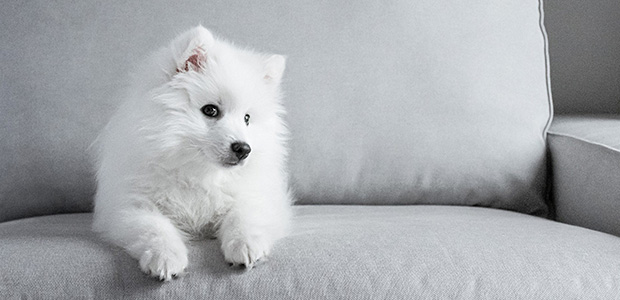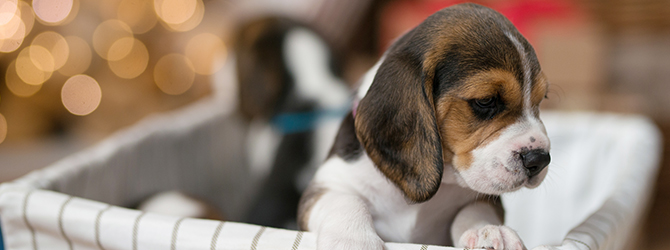How to puppy-proof your house
First Published: 24/02/2020
Last Updated: 17/10/2023
So you’re about to get a new puppy?
Here’s how to make sure your house is as safe as possible for your furry friend – whether they’re a young pup or an older rescue dog.
Can they chew it?
This is a question your dog will ask themselves often. Whatever they see lying around, they’ll try to chew it. Chewing is natural behaviour for dogs, especially puppies, so make sure you have plenty of toys for them to chew on – this will distract them from your furniture.
Make sure you don’t leave valuable items, such as books, toys and electronics, lying around. Cables and wires can be very dangerous if your dog chews them, so make sure you keep them out of their reach as best you can. Never leave your new puppy alone in a room with live wires. The same goes for sharp objects.
Can they eat or drink it?
Puppies use their mouths to explore their surroundings. If they’re drawn to the taste of something, you can be sure they’ll try to eat it.
Take care when you’re eating food, and make sure it’s kept out of your dog’s reach at all times. Certain human snacks, such as chocolate and grapes, are highly poisonous to dogs.
Household chemicals like antifreeze are very appealing to dogs, but are toxic to them. Be sure to keep cleaning products and medication safely out of your pup’s reach, preferably behind a high cupboard or a secure door.
Read more: Dog poison: protecting your pet from common poisons.

Is everything stored in the right place?
Try to think from your dog’s point of view. Do you keep chairs close to windowsills and worktops? Do you ever leave harmful items on those windowsills/worktops – even for a second?
Make sure everything is stored in a safe place. Yes this may mean rearranging your living room for a while, but it’s worth it to keep your dog safe.
Is it safe to leave the house?
Sadly, we sometimes have to leave our furry friends on their own while we go out.
If your new dog is a puppy, it’s useful to have a crate to put them in while you’re away. Read our guide to crate training your puppy.
If your dog is particularly inquisitive, try adding a safety gate to the kitchen, bedrooms or utility room doorway.
Keeping your dog entertained will also help to kerb the mischief. If you’re leaving them alone, try giving them an activity feeder, along with plenty of toys; this will prevent boredom, which often leads to destructive behaviour.
Need more info?
For more help and advice on puppy-proofing your home, or any aspect of welcoming a new dog to the family, have a chat with your local vet.
Find your nearest vet using our Find a Vet page, or speak to a vet online using Online Vets.



